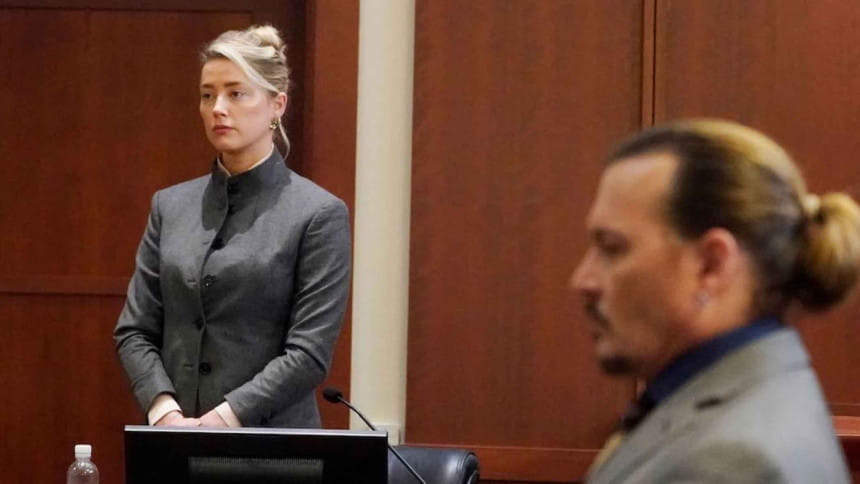Heard words are worthy, those unheard are bitter

The creator of the Harry Potter series, JK Rowling, is probably the richest author in the world, with an estimated net worth of USD 1 billion. In one estimate, Rowling made USD 181 per minute or USD 4.37 per word in 2016-17.
Here we are in 2022. Hollywood actor Amber Heard has been slapped with a USD 15 million penalty for writing 11 words that evidently damaged the fame and career of her former husband, Johnny Depp. These words were featured in an op-ed written for The Washington Post in 2018. Heard wrote, "Two years ago, I became a public figure representing domestic abuse." The article had an elaborate title: "I spoke up against sexual violence—and faced our culture's wrath." Depp sued Heard for the damage that those words had caused him, even though the actor was not explicitly mentioned in the article. Depp was, for instance, relieved from his iconic role of Jack Sparrow in the Pirates of the Caribbean franchise. His lawyers have now proven that the piece was indeed defamatory by implications, and a jury agreed. It won't take a genius to assess the negative worth of these words of Heard.
British romantic poet John Keats once stood before a Greek urn for ashes of the dead in a museum, and commented on its lively images, "Heard melodies are sweet, but those unheard are sweeter." I guess a play upon the Keatsian paradox is in order now that Amber Heard has been both heard and unheard. Her words, written as a testimony pertaining to the #MeToo movement, can be deemed prophetic as she has effectively felt the full blast of "culture's wrath." The unheard story of Heard is as bitter as that of Kadambini in Rabindranath Tagore's short story "The Living and the Dead," who only by dying was able to prove that she had indeed been alive. The undoing of Heard, many feel, is an expression of misogyny that pervades our culture. While I am happy to see Depp reclaiming his former glory through this win, I am equally mindful of the damage that this court case has done.
Dubbed as "the case of the century," the Depp-Heard defamation trial became a reality show as they agreed to live-cast the court proceedings. As we started hearing the case, the discourse became a bedroom drama where the fourth wall was broken to give us, the voyeuristic audience, access to the private lives of glitzy stars. The performance of the lawyers, too, started influencing public opinion. Thanks to the double piston of Depp's charisma and Heard's quirkiness, the mob sentiments started sliding towards the versatile actor. There was a growing contemptuous consensus among the public that Heard was lying about her abuse. She was portrayed as someone with a borderline personality disorder who is manipulative enough to fake photos to show Depp's beatings or to coax her friends into vilifying her spouse. In six weeks, the public opinion changed from anger towards Depp for confiding to friends about his venom against his ex-wife, to sympathy. Depp vowed revenge after his divorce, "She is begging for global humiliation. She is going to get it." He even shared the thought of raping her corpse in a text message to a friend. The drama has culminated in a series of "yes" from the jury to highlight Depp's story of being the abused one in this relationship.
The rise of "his story" and the burial of "her story" in this "he said, she said" drama has now put a serious question mark over the freedom of expression. Pundits in the US are even reflecting on the state of their First Amendment. With the current legislation against abortion, things are not looking right for women in the US. But my concern is in the power of words. Can you say things without impunity, especially in a culture where Big Brother is watching?
The issue became relevant for us when we heard the leaked recordings of a conversation between a young girl and her powerful patron. The girl was verbally raped before being suspiciously found dead. "History" tells us that girl took her life under alleged suspicion of embezzling a huge amount of money from her protectorate. Then we heard that an online media house was blackmailing the powerful man for an obscene amount of money, threatening to dig into the alleged suicide. Once again, the conversation of the media men was leaked—and in a dog-eat-dog world, we are seeing the power of words. The girl named after a songbird has stopped singing. We are hearing the howls and growls of the predators. And "his-story" prevails.
I am not a legal expert to comment on the merit of the Depp vs Heard case. Like many of my generation, I grew up with TV series such as Paper Chase, L.A. Law, Ally McBeal, Boston Legal, and of late, Suits. These shows have given me some insights into how legal discourses work, and how righteousness can be constructed. They helped me consider both sides of an argument and taught me not to be judgemental.
Then again, I wonder why I got drawn to this particular real-life drama. Celebrities have a larger-than-life existence. They are deified and located in their stardoms. But when we hear about their dysfunctional personal lives in gossip magazines or court cases, we start to relate with them. The engagement is therapeutic as we learn that human oddities do not discriminate. Celebrities, too, can get into a fight, just like we do in our personal lives. What happens in LA can very well happen in Dhaka. What happens to Heard can very well happen to a young ambitious girl who wants to move up in society in Dhaka.
At least Heard was heard. She had the patience and fortitude to withstand the shaming and character assassination. In many cases, the patriarchal culture's wrath remains unheard. We hear it when Western clothing triggers a mob in the railway station of a provincial town, causing them to attack a passenger. We hear it when a traffic constable stops a car in Dhaka city only to find that a girl is being raped by a rich man's son. We hear it here and there. Not too many women get the opportunity and privilege to get themselves heard.
The real cost of Heard's "negative worth" for writing those 11 words can never be estimated.
Dr Shamsad Mortuza is the pro-vice-chancellor of the University of Liberal Arts Bangladesh (ULAB).

 For all latest news, follow The Daily Star's Google News channel.
For all latest news, follow The Daily Star's Google News channel. 








Comments